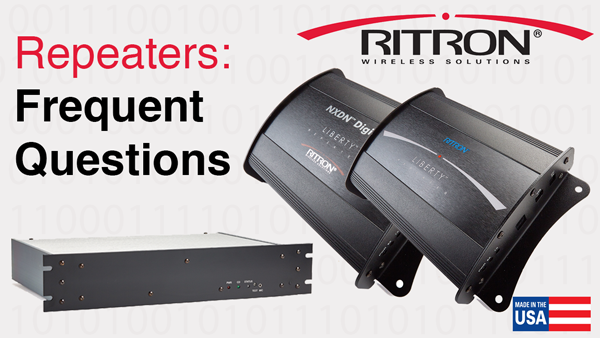 Repeaters: Frequent Questions
Repeaters: Frequent Questions
Our engineering staff recently addressed the most frequent questions we’ve received regarding repeaters. They include:
What is a radio repeater?
An active radio device for extending the range of a portable or mobile radio system.
What is the main benefit of a repeater?
A repeater enables two-way radios to achieve better coverage, better penetration, and longer range than is possible without a repeater.
How does it work?
A repeater receives the radio signal on one frequency and simultaneously transmits the same signal on another frequency. Typically, a repeater is placed in a location where it can have a virtual line of sight to all radios in the system. Radio signals do bounce off buildings and in some cases diffract or bend around buildings or mountains.
What’s the optimal location to mount a repeater?
The optimal mounting location is dependent on your structure and environment. Before installing the repeater, we encourage a radio coverage site survey be completed to ensure optimal radio range and coverage. This involves placing the antenna in an optimal central location, and simulating coverage you might expect if the antenna was installed in this location.
How is a repeater made?
A typical repeater has five components: antenna, duplexer, receiver, baseband processor, and transmitter. The duplexer allows a single antenna to both receive the signal on one frequency and transmit the signal on another. The receiver filters and amplifies a low level signal and so it can be processed and sent to the transmitter.
How does a digital repeater differ from an analog repeater?
The main difference is in the baseband processor. In an analog repeater, the receiver voice is filtered and sent directly to the transmitter modulator. Any noise received will be sent to the transmitter. Whatever a radio receives, this repeater downlink will have noise additions from both the uplink to the repeater and the downlink from the repeater. In the digital repeater, the baseband processor converts to binary bits which get error corrected and then sent to the transmitter. The radio receiving the repeater will also error correct this downlink signal resulting in noise free voice. Only when the signal gets too weak in either the uplink or downlink does the voice decode start to break up and drop out.
Do I need a license?
Yes. Typical repeater licenses at UHF require a frequency pair operating 5 MHz apart. Typically the repeater receives on the higher frequency and transmits on the lower frequency. This can be reversed if needed by swapping cables inside and re-tuning if necessary.
How can I improve range?
By using higher antenna gain, more power on the transmitter, or better antenna location. Make sure the coaxial cable connecting the repeater duplexer to the antenna is a good quality, low loss cable in good condition. Also, make sure there are no interfering signals jamming the receiver. The receiver squelch LED indicator can aid in indicating when the channel is busy with a signal.
Can I link repeaters together?
This is possible, but gets complicated. You cannot simply invert the repeater pair on another site. A repeater downlink output cannot be on the same frequency as a repeater uplink receiver input. You would need two other repeaters with two other sets of repeater pairs to extend the range using repeaters only.
What two-way radios are compatible with my repeater?
The Ritron Liberty Repeater (analog) is compatible with the Ritron JBS-447D Jobcom Base Station as well as Ritron JMX-446D UHF Jobcom Portable Radios. The Ritron NXDN Digital Liberty Repeater is compatible with the Ritron XD Series NXDN Digital Callbox as well as NXDN 2-way radios.
Do they require any special programming?
All compatible radios must be specifically programmed for use with a repeater.
How do I find more information?
- Click here to schedule a consultation with one of our account managers or to be connected to our dealer network.
- View Dealer Resources
Learn More and Find Technical Specifications:
- NXDN Digital Liberty Repeater RLR-465NX
- UHF Analog Liberty Repeater
- RRX Series Programmable UHF Repeater
Related Topics: Transmitters, Transceivers, Wireless Technology Solutions, Construction Two Way Radios, Repeaters